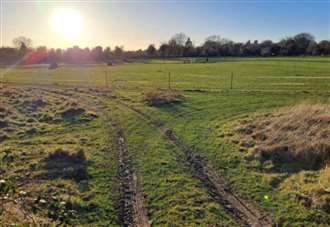Business
Planning Inspector Rejects Developer’s Appeal for Housing Scheme

A planning inspector has rejected an appeal from Clague Architects regarding a controversial housing development in Great Mongeham, England. The proposal aimed to construct 23 new homes on five acres of farmland, which had previously been turned down by the Dover District Council (DDC). The council’s decision was based on concerns that the development would cause “significant harm to the character and appearance of the countryside and landscape area.”
The application faced considerable opposition from local residents, with 215 letters of objection submitted to the council. The objections mainly focused on the potential loss of wildlife habitat, pedestrian safety issues, and concerns over noise and air pollution. Residents also expressed fears regarding privacy loss and light pollution, as well as the belief that there was no need for additional housing in the area.
The Great Mongeham Parish Council strongly opposed the application, describing it as “completely unsuitable for the location.” Following the council’s refusal, Clague Architects appealed the decision, arguing that the development would be considered “windfall development” that could assist the local authority in meeting its housing targets.
In its appeal, the developer contended that the council’s refusal was “not justified or grounded within accepted landscape impact assessment methodology.” However, the planning inspector ultimately sided with the DDC, concluding that the disadvantages of the proposal, particularly its impact on the landscape and heritage assets, outweighed the benefits associated with new housing, including affordable and self-build options.
The application site, located off St Edmunds Road, is currently used as pastureland for horse grazing and serves as a village green for fairs, sports, and recreational activities. The inspector’s decision to reject the appeal also included a ruling on costs, noting that the DDC had acted reasonably in its initial decision, and thus no costs would be awarded to the appellant.
The outcome highlights ongoing tensions between development aspirations and community concerns in rural areas. Local stakeholders remain vigilant as future proposals may arise, with many residents advocating for sustainable practices that prioritize the preservation of the local environment and community character.
-

 Entertainment3 months ago
Entertainment3 months agoAnn Ming Reflects on ITV’s ‘I Fought the Law’ Drama
-

 Entertainment4 months ago
Entertainment4 months agoKate Garraway Sells £2 Million Home Amid Financial Struggles
-

 Health3 months ago
Health3 months agoKatie Price Faces New Health Concerns After Cancer Symptoms Resurface
-

 Entertainment3 months ago
Entertainment3 months agoCoronation Street’s Carl Webster Faces Trouble with New Affairs
-

 Entertainment3 months ago
Entertainment3 months agoWhere is Tinder Swindler Simon Leviev? Latest Updates Revealed
-

 Entertainment4 months ago
Entertainment4 months agoMarkiplier Addresses AI Controversy During Livestream Response
-

 Science1 month ago
Science1 month agoBrian Cox Addresses Claims of Alien Probe in 3I/ATLAS Discovery
-

 World2 weeks ago
World2 weeks agoBailey Announces Heartbreaking Split from Rebecca After Reunion
-

 Health4 months ago
Health4 months agoCarol Vorderman Reflects on Health Scare and Family Support
-

 Entertainment4 months ago
Entertainment4 months agoKim Cattrall Posts Cryptic Message After HBO’s Sequel Cancellation
-

 Entertainment3 months ago
Entertainment3 months agoOlivia Attwood Opens Up About Fallout with Former Best Friend
-

 Entertainment2 weeks ago
Entertainment2 weeks agoCoronation Street Fans React as Todd Faces Heartbreaking Choice





















